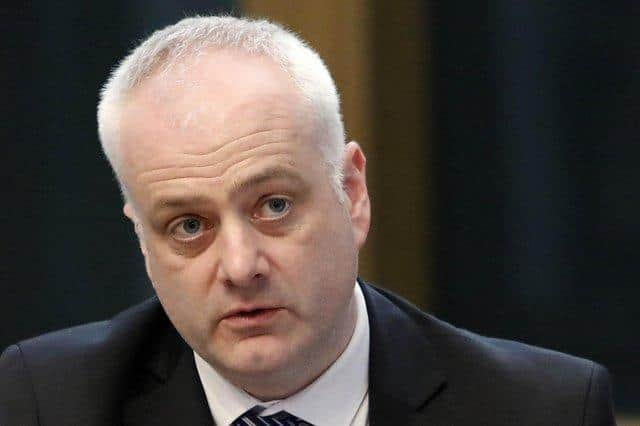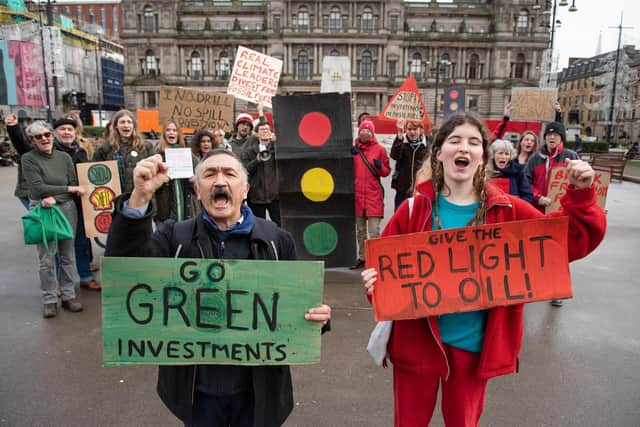Exclusive:Major public workers' pension fund condemned over 'destructive' fossil fuel investments
Scotland’s largest local authority pension fund still has more £180 million tied up in oil and gas companies, including major holdings in firms criticised by the fund’s own investment managers for having “weak” climate change strategies and no apparent net zero commitments.
Strathclyde Pension Fund (SPF), which has more than a quarter of a million members across the Scottish public sector and manages a total of £28.4 billion in funds, promised more than two years to disinvest from “bad oil companies” amid growing concerns over its holdings in highly polluting firms engaged in oil and gas extraction. At the time, SPF director Richard McIndoe promised that “if any of those companies don't meet the minimum standards that we set, then we can disinvest from them”.
Advertisement
Hide AdAdvertisement
Hide AdDespite the policy being implemented last year, the fund still invests in one firm its investment managers said had to improve in the “key areas” identified by the new assessment criteria. It also has a stake in Equinor, developer of the controversial Rosebank North Sea oil project.
The SPF also maintains holdings in companies roundly condemned by campaigners and investors over their climate policies.
One of Scotland’s leading environmental charities described the fund’s assessment system as not fit for purpose. But the SPF said the firm in question rated “much more strongly” in other areas. Its chair stressed the fund was “on a journey” and “is only going to get cleaner.”
The SPF has direct holdings in 19 fossil fuel companies. Cumulatively, they were worth £180.9m as of June – around 0.65 per cent of the total fund. They include £1m in SM Energy, a US firm involved in the production of crude oil and natural gas. According to an analysis overseen by investment management firm Hymans Robertson for the SPF, the underlying climate strategy in place at SM Energy is “weak.” An individual company analysis, prepared for the fund by JP Morgan, noted that SM Energy “does not appear to have a commitment to net zero.” It said the company “needs to improve in the key areas identified by the minimum standards assessment.”
Instead of disinvesting, the SPF asked JP Morgan to “accelerate engagement” with SM Energy, one of two companies Hymans Roberston assessed as “amber”. The other is Serica Energy, a North Sea oil and gas producer. The SPF has £1m invested in the firm.


In recent years, several member councils of the SPF, including Glasgow, have passed motions calling on it to disinvest from fossil fuels, with pressure also coming from parliamentarians at Holyrood and Westminster. The fund says it has already reduced its exposure to oil and gas by “well over 50 per cent,” with more than £750m invested in renewables.
But Sally Clark, divestment campaigner at Friends of the Earth Scotland, accused the fund of “ignoring the votes of democratically elected councillors” and “funding climate catastrophe”.
She said: “Two years after the SPF committee agreed to divest from any companies that do not meet minimum climate standards, it is shocking that the fund is still gambling with our futures by putting members’ savings into climate-wrecking fossil fuels.
Advertisement
Hide AdAdvertisement
Hide Ad“Any climate assessment system that would allow the fund to keep putting members’ savings into the most polluting oil companies in the world clearly wouldn’t be worth the paper it is written on. “


The discontent over how the pension fund is continuing to stand by such fossil fuel investments comes as Humza Yousaf is preparing to present Scotland as a global leader in delivering its climate pledges. The first minister is set to arrive in New York today for Climate Week NYC, and will deliver a keynote speech tomorrow.
In it, he will call on other governments and cross-sector organisations to not only pledge, but mobilise loss and damage funding. Mr Yousaf is expected to say that “Scotland has demonstrated that we are prepared to walk the walk where many others, to this point, have merely talked the talk.”
The SPF’s single biggest fossil fuel holding, worth nearly £60m, is in Reliance Industries, an Indian multinational conglomerate, followed by £40m in NOV, a Texas-based provider of equipment and components used in oil and gas drilling. Its stake in Equinor, the principal developer of Rosebank, the largest untapped oil and gas field in the UK is £3.6m. A decision by the UK government over whether to approve development at the oil field west of Shetland is expected soon.
The fund’s other investments include £5.5m in Woodside Energy, Australia’s biggest oil and gas producer, which has been subjected to repeated protests. Earlier this year, Greenpeace described its latest climate report as a “schoolboy effort” that betrayed its “lack of genuine commitment to emissions reduction.”
The details of the SPF holdings coincide with increasing scrutiny of how major investment firms are continuing to back fossil fuel firms. Baillie Gifford, one of several investment managers used by SPF, has been the subject of protests over its ties to oil and gas entities. The decision to buy, sell, or retain individual companies is delegated by the SPF to its external investment managers.
Mark Ruskell, climate spokesman for the Scottish Greens, said that in the wake of COP26, councillors who oversee the fund should be “putting its money where its mouth is.”
“This is extremely concerning. SPF is the largest of its kind in Scotland and should be leading by example,” he explained. "Public money should not be invested in polluting and destructive companies and industries that are taking us even further down the path of climate breakdown.
Advertisement
Hide AdAdvertisement
Hide Ad"There are serious questions to be asked of the fund directors, as this seems totally at odds with the promises that were made two years ago. We will be working with Green councillors in Glasgow to ensure this gets the scrutiny it deserves.
Dr Lewis Coenen-Rowe, a campaigner with the Divest Strathclyde group said the SPF’s fossil fuel investments went against the wishes of councillors, trade unions, and members of the fund who “want their money moved.” He added: “It is unacceptable and totally unnecessary.”
The questions around the pension fund’s investments coincide with uncertainty over whether the state pension will be raised to match official overall earnings figures. Prime Minister Rishi Sunak has so far failed to commit to keeping the pension triple lock after the next election.
In a statement, SPF said under its new policy, investment managers are required to assess the “environmental risk” of every investment they make and advise of their strengths and weaknesses. It pointed out that all ten companies subjected to initial assessments had improved their scores.
Richard Bell, the SPF chair, said: “I’m proud of the work we are doing, but I’m also realistic. We are breaking new ground and we are learning all the time. So are our investment managers and, to a great extent, some of the companies we hold.
“In some cases, the data and the disclosure of plans and targets that we are looking for just aren’t there because, at a government and regulatory level, they have never been demanded. So, we’re asking for things very few other investors are and we’re trying to take people with us.
He added: “In others, you have to give the managers the opportunity to go back and put a little bit of pressure on, to ask the difficult questions. If the right answers don’t come back, that’s when you might reasonably expect them to be thinking about divesting.”
Comments
Want to join the conversation? Please or to comment on this article.